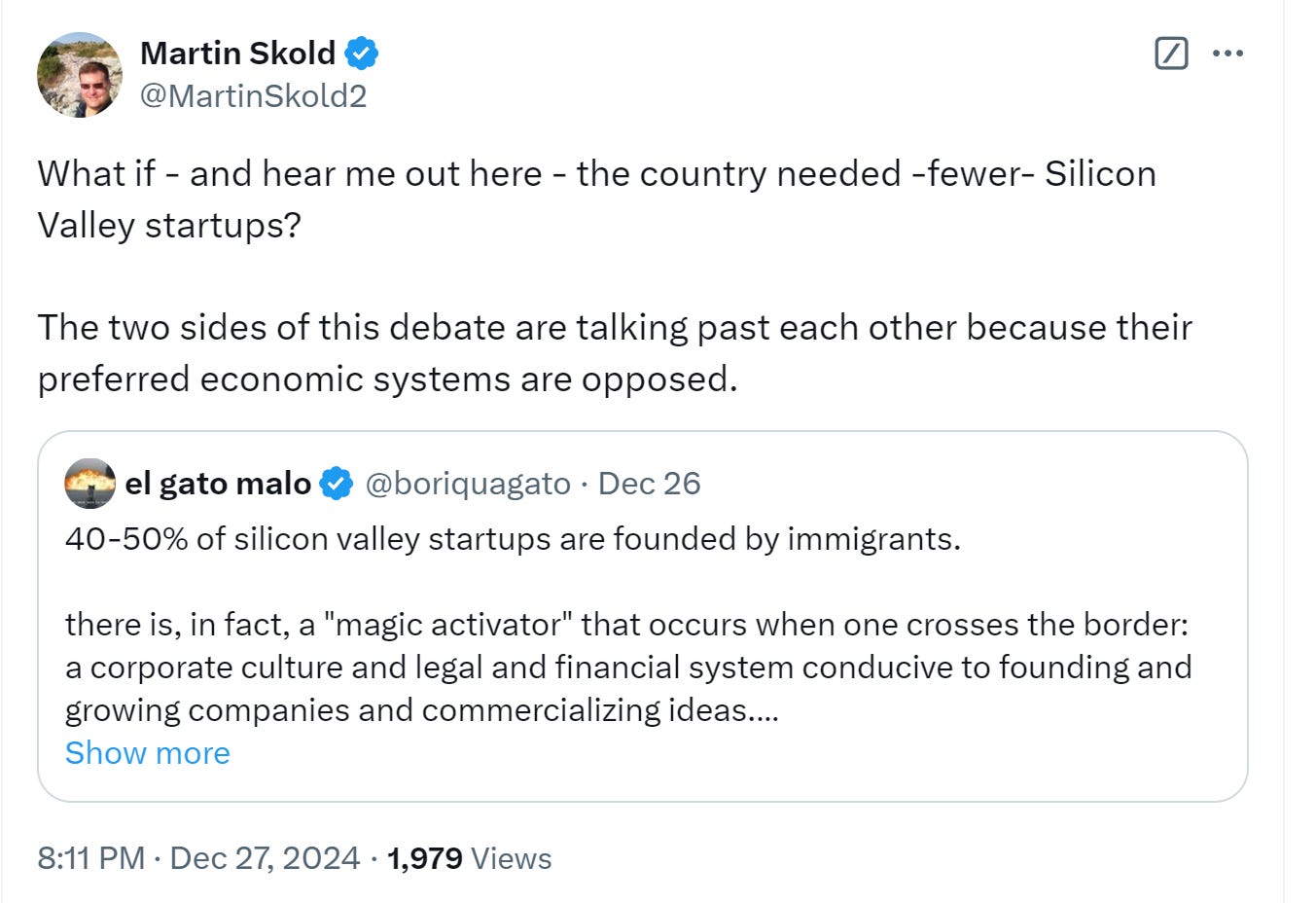When Rage-Farming Replaces Reason: Lessons from the Immigration Twitter Storm
Flopping Aces ^ | 12-28-24 | El Gato Malo
Posted on 12/29/2024 8:31:28 AM PST by Starman417

In the fine bad cattitude tradition of “making everyone angry by weighing in on multiple sides of issues of current calamity,” here comes a whole set of takes on immigration, economy, and culture. Some of it is likely to make many people mad. But let’s remember: not liking a fact does not make it false, and not agreeing with everything that someone says does not invalidate the points they make.
This one seems to have really brought the bats down from the rafters, and I’m sure we’ll get a comments section for the ages. But please, can we do two things:
- Stay respectful and reasoned rather than nasty and emotional. This is not about tribes, and making it tribal prevents the emergence of consensus, understanding, and reason. We need not agree on all things to learn from one another.
- Make an effort to engage with what others are actually saying, not with some version of their view that you are making up and ascribing to them. Nuance is our friend here. Let’s be sure to invite him to the table.
Please apply the golden rule of “reading with the charity with which you in turn would like to be read.” This was a lot to try to pull together.
OK, game on.
Here we go.
For those not on Twitter, the last couple of days have been an immigration food fight seemingly kicked off by Vivek saying some half-smart, half-tone-deaf stuff, and Elon wading into it without much finesse or calibration. Then wave upon wave of “telephone” amplified and distorted messages into straw men of utmost flammability, used to feed both racist trolling Indians (dot, not feather) and nativist American economic illiterates alike—pitting the worst, least informed, and least representative of two factions against one another in a horizon-to-horizon fracas to see who could be more offensive. It was rage farmer Valhalla.
Welcome to the internet. There’s not really a helluva lot one can do about that apart from letting tempers cool and then seeing if anything useful was learned.
What I learned was this: there’s some dangerous entitlement and reality denial on both sides, and some folks clearly want a fight on this issue. But the reality is twofold:
- There’s actually mostly agreement here (especially that nearly everyone, including Vivek, hates the H-1B program).
- The problem is that everyone is focusing on the wrong question.
Emphasis on “overly optimistic.”
OK - so that escalated quickly!
Twitter rapidly devolved to poo, then rock, and then actual bomb throwing. So I basically said, “Yeah, this is not going to be a place to have much in the way of productive discourse in the near term.” But as things have now calmed down a little, and at the risk of kicking nests of at least somewhat quiescent bees, I’d like to go back to some themes that seemed lost or ignored in the great Christmas immigration conflagration.
Let’s see if we can set the stage with some shared belief.
Some salients:
- Human capital will be the most important capital in the world for the next couple of decades. Being “the best AI builder in your town” will be basically meaningless in global markets.
- Human capital exists in many places both in the US and abroad.
- The question is how do we develop it, and under what conditions can that capital thrive?
This is my answer:
Because human capital is only useful in systems where human capital can flourish and realize potential. It’s like asking why the son of an NBA player never got good at basketball while ignoring the fact that he was raised in a cave with 5-foot ceilings and never allowed outside or to stand up straight.
Human capital may be easily thwarted. The Soviet Union did not lack for smart people. It lacked any outlet for them to build things.
Human capital requires and creates freedom, systems, and structures to thrive. It requires an ethics and ethos where such thriving is encouraged, enabled, and protected.
And that is what has, for generation after generation, attracted so many of the best and brightest to America.
America was the preferred place to chase and build your dream and pursue your happiness.
The “activator” is real. The activator is America. One can do here that which cannot be done in China or India or Japan or France. The ceiling is raised.

Martin, who I do not know but who seems like a reasonable guy engaging in good faith, then asks this.

I don’t mean to single him out, and please don’t dogpile him. It’s just a good sort of Socratic question and, honestly, the kind of civil and potentially productive engagement that makes social media useful. And I think he’s correct about the sides talking past one another. I’d like to explore what I see to be the disconnect.
Firstly, I disagree on one matter: we do need more startups, Silicon Valley or otherwise. That said, it matters a great deal what kind of “Silicon Valley startup” we’re discussing. The old kind was awesome. Many of the new ones are a blight, but this does not mean that all or even most are, just the biggest and best connected that gather so much limelight.
I was there in the 90s and 2000s. The hot new tech at the time was a thing called “the internet.” It turned out to be pretty useful, and it really could only have emerged at the kind of speeds and capacity that it did in a place like Silicon Valley. Anyone who thinks “But DARPA would have invented it all!” simply has no idea what happened.
The problem is that the culture of hard work, big risks chasing big visions, and endless hyper-competitive creative destruction has atrophied and been replaced by something else: big business tactics of crony corporatism and aristocratic capture of political systems. This has turned the ethos on its head.
California ate the Valley.
I barely recognize the place. Sand Hill Road might as well be lobbyist row in McLean, Virginia. VCs hire Al Gore to make sure their portco products are mandated. PE buys up all the HVAC installers, then pushes new air handling rules for COVID and mandates heat pumps.
As a result, I think that many of Vivek’s own words may be turned against Silicon Valley (in a manner, incidentally, that I suspect he would agree with).
He states:
“A key part of it comes down to the c-word: culture. Tough questions demand tough answers & if we’re really serious about fixing the problem, we have to confront the TRUTH:Our American culture has venerated mediocrity over excellence for way too long (at least since the 90s and likely longer).
That doesn’t start in college, it starts YOUNG.”
A culture that celebrates the prom queen over the math olympiad champ, or the jock over the valedictorian, will not produce the best engineers.”
And there is obvious truth here, albeit also truth that misses the fact that engineers tend to make lousy CEOs and visionaries, and that “winning the math olympiad” and “being able to build a high-function organization” are often at odds with one another. I, for one, love to hire athletes because they come with drive, discipline, desire to win, and a hatred of losing (which is not the same as desire to win). His take gets a bit myopic and nerd-centric. (I say this as both a jock and a math olympiad winner.)“All math, no outside life” is not a path to innovation. Ask China.
But to get to the real insight, problem, and bifurcation, let’s substitute “crony corporatism” for “mediocrity” and “connected political activist paying for play and wrapping themselves in platitudes of diversity, equity, and servitude to false collectivist problems ginned up to demand expensive mandates for collectivist solutions to justify this” for “prom queen” and “jock.”
Because this is the real divide, the part many of the tech bros are missing, and the reason so many are finding them so infuriating.
I think people are talking past each other on this because the debate has been framed incorrectly, leaving the truly important issue to go begging.
Sili-Valley is appealing to what it once was but, like so many American institutions, has lost much of the virtue that underpinned such institutional and cultural conception.
Instead, a tone-deaf aristocracy advantaged by subsidy, connection, and diversity and equity edict is mocking those who are forced to give up their places (and worse, their culture) to it, and telling the same people who can no longer get into top schools based on merit that they are failing at meritocracy and that hiring that slants heavily against their inborn characteristics is somehow their fault for going to prom.
“Why didn’t your race attend the engineering school that discriminates against your race or gender?” is not much of an argument.
The wokelord Google gang is not the “proof of fitness” test it claims to be (and is, frankly, failing badly now as a result and will soon be an irrelevancy if it does not get its act together).
You don’t get to grab spots at university with skin tone, then claim meritocracy.
This is self-flattery of the most excremental form.
Silicon Valley has become a crony corporate hypocrisy hill.
And that, ultimately, is why people are so pissed.
(Excerpt) Read more at floppingaces.net ...
TOPICS: Government; Politics
KEYWORDS: h1b; musk; trump; vivek

Click here: to donate by Credit Card
Or here: to donate by PayPal
Or by mail to: Free Republic, LLC - PO Box 9771 - Fresno, CA 93794
Thank you very much and God bless you.
1 posted on 12/29/2024 8:31:28 AM PST by Starman417
To: Starman417
2 posted on 12/29/2024 8:32:17 AM PST by rktman (Destroy America from within ? Check! WTH? Enlisted USN 1967 to end up with this💩? 🚫💉! 🇮🇱👍!)
To: Starman417
Reader’s digest version please?
3 posted on 12/29/2024 8:35:20 AM PST by central_va (I won't be reconstructed and I do not give a damn...)
Disclaimer: Opinions posted on Free Republic are those of the individual posters and do not necessarily represent the opinion of Free Republic or its management. All materials posted herein are protected by copyright law and the exemption for fair use of copyrighted works.
FreeRepublic.com is powered by software copyright 2000-2008 John Robinson

 By Free Republic | Created at 2024-12-29 16:35:21 | Updated at 2025-01-01 15:52:24
2 days ago
By Free Republic | Created at 2024-12-29 16:35:21 | Updated at 2025-01-01 15:52:24
2 days ago








